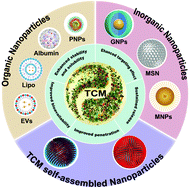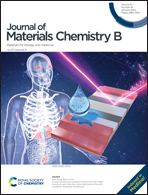Nano-traditional Chinese medicine: a promising strategy and its recent advances
Abstract
Traditional Chinese Medicine (TCM) has been applied to the prevention and treatment of numerous diseases and has an irreplaceable role in rehabilitation and health care. However, the application of TCMs is drastically limited by their defects, such as single administration, poor water solubility, low bioavailability, and weak targeting capability. Recently, nanoparticles have been extensively used in resolving pharmaceutical obstacles in consideration of their large specific surface area, strong targeting capability, good sustained-release effect, etc. In this review, we first describe the limitations of TCM ingredients and two significant forms of nanotechnology applied in TCM, nanometerization of TCMs and nano-drug delivery systems for TCMs. Then, we discuss the preparation methods of nanometerization: mechanical crushing, spray drying, and high-pressure homogenization, which have been utilized to conquer the various weaknesses of TCMs. Then, recent advances in nano-drug delivery systems for TCM ingredients are discussed, including lipid-based nanocarriers, polymeric nanoparticles, inorganic nanocarriers, hybrid nanoparticles, and TCM self-assembled nanoparticles. Finally, the future challenges and perspectives of TCM formula complexity and the limitations of nanocarriers are also discussed. Better understanding the function of nanotechnology in TCM will help to modernize Chinese medicine and broaden the application of nano-TCM in the clinic.



 Please wait while we load your content...
Please wait while we load your content...